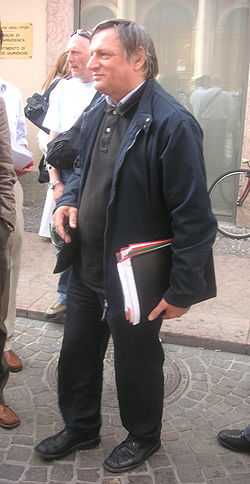Luigi Ciotti
Luigi Ciotti, born in Pieve di Cadore (province of Belluno) on September 10, 1945, is an Italian priest belonging to the Roman Catholic Archdiocese of Turin, deeply involved in the fight against illegality and organized crime such as Mafia.

Biography
Luigi Ciotti emigrated with his family to Turin in 1950. He was ordained priest in 1972 by Cardinal Michele Pellegrino, who assigned him to the “parish” of the streets of Turin.
Ciotti's involvement with social work started in 1966, when he organized the Gruppo Abele (Abel's Group), dedicated to follow cases inside the Juvenile Detention Centers, and help the victims of drugs. Sixteen years later, in 1982, he promoted the foundation of CNCA, the national network of organizations dedicated to charitable hospitality. In 1987 he was appointed the first president of the Italian League against AIDS (LILA), founded by Franco Grillini and friends in 1986. On March 25, 1995 he started the association Libera (Free), in charge of coordinating the effort of various Italian organizations against organized crime.
Publications
Ciotti is a well-known national author and publisher in the religious and educational fields. In 1988 he started to write for newspapers and specialized magazines dealing with social work and public education. In February 1993 he published the first issue of the monthly magazine Narcomafie (Narcotics Mafias). He has authored a few books dealing with educational and social problems, such as Genitori, figli e droga (Parents, Children and Drugs), written in collaboration with Vaccaro, and Chi ha paura delle mele marce, (Who is afraid of the Rotten Apples).
Honors
On July 1, 1998, Ciotti has received the Honorary Degree in Education by the University of Bologna. He has considered this honor a recognition for the hard work of all the people of the Gruppo Abele along the years. He is also the recipient of the Cavaliere di Gran Croce (Cavalier of the Great Cross) award, by the Italian Government. On June 23, 2007, he received the "Premio speciale San Bernardo" (Special Prize St. Bernard) for his endeavors to solve social problems.
Media
- Short interview with Father Ciotti on YouTube, in Italian language
See also
- Drug addiction
- Drug rehabilitation
- Illegal drug trade
- Streetwise priest
External links
- Luigi Ciotti - Enciclopedia Multimediale delle Scienze Filosofiche (Multimedia Encyclopedia of Philosophical Sciences)
- Associazione Gruppo Abele Onlus
- Narcomafie (Narcotics Mafias)
- - Libera - association against the Mafia, official site
|